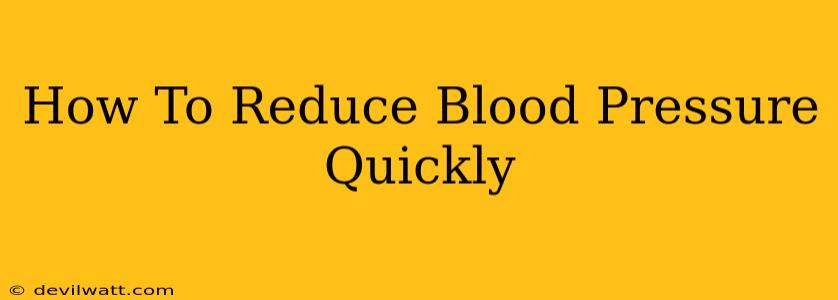High blood pressure, or hypertension, is a serious health concern affecting millions worldwide. Understanding how to reduce blood pressure quickly is crucial for managing this condition and preventing potentially life-threatening complications like stroke and heart attack. While immediate drastic drops in blood pressure should be handled by medical professionals, there are several safe and effective strategies you can employ to lower your blood pressure relatively quickly, alongside your prescribed medication if applicable. This information is for general knowledge and should not replace professional medical advice. Always consult your doctor before making significant changes to your diet or lifestyle, especially if you have pre-existing health conditions.
Lifestyle Changes for Quick Blood Pressure Reduction
Many lifestyle modifications can contribute to a noticeable reduction in blood pressure within a relatively short timeframe. These changes are not only effective for quick relief but also for long-term blood pressure management.
1. Immediate Stress Reduction Techniques:
Stress is a major contributor to high blood pressure. Learning to manage stress effectively can yield almost immediate results. Try these techniques:
- Deep Breathing Exercises: Practice deep, slow breaths for several minutes. This can calm your nervous system and lower your heart rate, leading to a temporary decrease in blood pressure.
- Progressive Muscle Relaxation: Tense and release different muscle groups in your body to relieve tension and promote relaxation.
- Mindfulness Meditation: Even a few minutes of mindfulness meditation can significantly reduce stress levels and blood pressure.
2. Dietary Adjustments for Rapid Results:
Certain dietary changes can offer quick blood pressure relief:
- Limit Sodium Intake: Sodium causes your body to retain water, increasing blood volume and blood pressure. Immediately reducing your salt intake can start to show results within days.
- Increase Potassium Intake: Potassium helps balance sodium levels and promotes fluid excretion. Consume potassium-rich foods like bananas, spinach, and sweet potatoes.
- Hydration is Key: Dehydration can increase blood pressure. Drink plenty of water throughout the day.
3. Physical Activity for Quick Benefits:
Even short bursts of physical activity can have a positive impact on your blood pressure.
- Quick Workouts: A brisk 10-15 minute walk, a quick jog, or some jumping jacks can help lower blood pressure temporarily. Regular exercise, however, is crucial for long-term blood pressure management.
Long-Term Strategies for Sustainable Blood Pressure Control
While the above strategies can provide quick relief, sustainable blood pressure control requires a holistic and long-term approach:
1. Adopt a DASH Diet:
The Dietary Approaches to Stop Hypertension (DASH) diet is a well-researched eating plan proven to lower blood pressure effectively. It emphasizes fruits, vegetables, whole grains, lean protein, and low-fat dairy products.
2. Regular Exercise:
Regular physical activity is essential for long-term blood pressure management. Aim for at least 150 minutes of moderate-intensity aerobic exercise per week.
3. Weight Management:
Losing even a small amount of weight can significantly impact blood pressure.
4. Limit Alcohol Consumption:
Excessive alcohol consumption can raise blood pressure. Moderate your alcohol intake or abstain completely.
5. Quit Smoking:
Smoking damages blood vessels and increases blood pressure. Quitting smoking is one of the best things you can do for your overall health.
When to Seek Immediate Medical Attention
While these strategies can help manage blood pressure, it's crucial to seek immediate medical attention if you experience:
- Severely elevated blood pressure readings
- Sudden, severe headache
- Shortness of breath
- Chest pain
- Vision changes
Remember: This information is for general knowledge and should not replace professional medical advice. Always consult your doctor or healthcare provider for personalized guidance on managing your blood pressure. They can help you develop a comprehensive plan tailored to your specific needs and health status. Your health is your priority. Take proactive steps to manage your blood pressure and live a long, healthy life.

